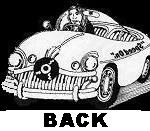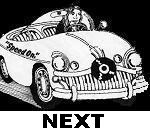The Tin Man Tinkles His Own Tune
By Noë Goldwasser
Crawdaddy Magazine
September 1973
After years of back-up, the popular piano-duster finally emerges with his own group. "Nicky Hopkins and the Session Men," jokes his wife.
It was a springy day, the birds were buzzing, the Beatles in the air The double-album anthologies filled the FM-waves, Paul and George were on the case with solo albums, and rumors were flying about new ones by Ringo and John and the Rolling Stones. However, Nicky Hopkins, super session man for various Beatles and Stones and other stars, was in town not to talk about them but about his own solo Lp, The Tin Man Was a Dreamer. I went downtown to ask him if he had any shirts to grind.
A low-key dude, no shirt-grinder by any means, Hopkins sat in his room like a china figurine contemplating the delicate patterns of his own musical inspiration. While his lady made phone calls and travel arrangements in a corner of the room, Nicky talked dreamily of his Mill Valley hideaway where he and Dolly have been spending the past couple of years living the life, making music, writing songs with a cassette player atop his piano and collecting old tins.
The Tin Man, then, is Hopkins, bearing no resemblance to the Wizard of Oz character, and his can collection of many years is the subject of an oil painting on the LP's back cover where, among the Players cigarette boxes and "Hopkins brand powdered Egyptian Henna," sits Nicky's cat, Pig. "I really dig old tins," Hopkins admits.
But Edward, the popular piano-duster's alter-ego, is the persona that reappears on this album. I asked Hopkins if he was finally convinced that "Edward the Mad Shirt Grinder" had become a by-Ed-word. "It's been recut properly this time as I always wanted it to sound. I mean, that's how I wrote it in me head, but it's not how it turned out with Quicksilver – it sure turned out right this time. Yes, it's much more compact. It makes much more sense, really. Then, of course, we have the mysterious George O'Hara coming in and doing overdubs."
The new version of "Edward" does click amazingly well, and it's a tribute to Hopkins' amiability as a backbone musician with some of this decade's most important players. George O'Hara is George Harrison, whose Living in the Material World was recorded in the same studio at practically .the same time as Hopkins' LP. On this scnq the personnel is Hopkins, piano; George on lead, Klaus Voorman, bass; Ray Cooper, percussion and conga; Bobby Keys on sax; and a drummer who sounds a lot like Ringo, Prairie Prince. "Prairie Prince is a real drummer from San Francisco," Hopkins contends.
Also featured on the album are Mick Taylor and Jerry Williams, who sings lead on the hard rockers. But Hopkins does a lot of singing on this LP, too, and it is this quality that personifies the work as a breakthrough for Nicky – known heretofore as the super session man who's backed everybody from The Beatles to the Stones, Kinks, Quicksilver, Jeff Beck and Rod Stewart.
"How do I think of myself as a solo performer? I'm really satisfied with the way the album turned out. It's the first time I've sang. It was done pretty loosely, really. We went to England in the beginning of September and, um, George was supposed to be recording. But he phoned from abroad to say that he was going to be another two weeks. He knew I was going to be recording and could I use the time? I said sure and I got all the basic tracks in those two weeks."
Nick credits engineer Phil MacDonald with the superb technical aspects of the album. “He's great. He was on Lennon's Imagine album. He did All Things Must Pass as well." wondered if things hadn't indeed passed. Hopkins sighed. "Oh God, I don't know what's going to happen. All anybody's doing at the moment is just writing material that they like. I don't know whether it'll go anywhere or not..." Hopkins comes across, ultimately, as a musician and not a theorist. He'd rather lay out during philosophical discussions and wait for the band to come.
"I mean, the only thing I can see going on now that's‘, any different than there ever was before is bands like Alice Cooper, things like that. I hope that's not the general direction that everything is going into. They’ll probably get out of that and get more into their music – relying more on music than theatrics. Or unless they keep coming up with new ideas they could presumably carry on but I would : ink that people'd get tired of it in the end.“Hopkins – try though he might to transcend the studio t image – typifies this breed‘s disdain for musical schlock any form. But, ultimately, he seemed to imply, the only way to combat mediocrity is to continue making art. Musicians of inspiration and talent don't have to rely on frills to get the point across. In times of creative fallowness it's those dedicated artists who have always been there, chopping away, who carry the ball. And some of these cats, working sessions like Nick did, in the early days, are now finally leading the way to good music.
"I guess that's why John McLaughlin is finally enjoying the kind of recognition he deserves,” I said.
"Yeah, that’s for sure," Hopkins agreed. "I remember when he was doing sessions in England years ago. He used to be just a session guy, very frustrated about it. But John was always a great cat. I’m glad he's made it."
And what of Nicky's own band, will he have to wait for that one, too? "The band of this album – apart from George O‘Hara – will be with me on the tour in October or November or both.”
"Nicky Hopkins and the Session Men," ¿oked his wife, Dolly. Nicky admits that Dolly was responsible for much of the song writing on the album, "but she wouldn't take credit because she thought that if she did, everybody’s say 'Oh, it’s another Paul and Linda thing.' She likes to help out, but keep out of the limelight. That’s how she is. She wants everything to go well and she's not into publicity for herself... but I figure it’s nice if it gets out in interviews and things. Harry Nilsson helped out a lot with the lyrics. I'm not that much of a lyricist because I don't listen to words, or very rarely. I probably couldn’t tell you half the words to any of the albums I've worked on.
"But the band will be called Nicky Hopkins, or Nicky Hopkins and Band; I don't feel like making any weird names for a band. People say the same thing... who the fuck's that? Why not call it toilet paper, or fluorescent lights?"
Hopkins comes across as a musician and not a theorist. He'd rather lay out during philosophical discussions and wait for the band to
 -
-
 -
-

 -
-
 -
-

 -
-
 -
-
